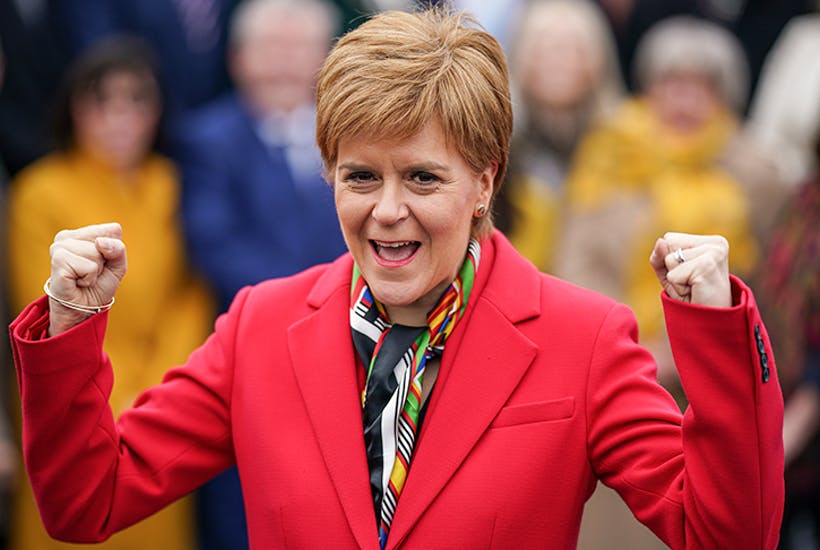Regardless of one’s views on climate change, one should welcome the fact that Boris Johnson removed Claire Perry O’Neill from her post as president of this year’s Conference of the Parties (COP 26), which will be held in Glasgow. He is at last trying to exercise the power of patronage. Ms Perry O’Neill is a George Osborne protegée, anti-Boris and anti-Brexit. She stood down at the end of the last parliament. She is also a keen self-publicist. Given that international climate conferences are chiefly forums in which governments strike attitudes, it was highly unwise to let her strike the Glasgow ones. She was almost bound to be disobliging to the government. With the election out of the way, the government recognised its mistake and acted just in time. Ms Perry O’Neill accidentally showed its decision justified by going on air this week to claim that Boris had told her he did not ‘get’ climate change. Little good can come of the Glasgow COP, as David Cameron presumably recognises by refusing to replace Ms Perry O’Neill. The Prime Minister is in a trap of his own making by sucking up to David Attenborough: all the more reason why the COP president should be in tune with the government. Since the spending of something between £20-40 billion of Treasury money per year is at stake, a current minister needs to be in charge. It has taken the Tories nearly ten years in office to learn to use patronage to advance their broad policy aims, not to offer publicly funded platforms to their critics. Tony Blair understood this from his first day in office.
Another reason why the Glasgow COP will be a nightmare is that it will be in Glasgow. The Scottish government will therefore emit unprecedentedly toxic levels of hot air. Nicola Sturgeon will go to greet foreign dignitaries at the airport (and Greta Thunberg at the quayside) as if she were the leader of an independent nation. Interesting that Donald Tusk is urging that she should be. While in office, no EU officials dare give public comfort to secessionists, because they know they must not provoke the rage of Spain, Belgium and so on, but when he was in office, Mr Tusk was always privately friendly to petty nationalisms. Now he speaks openly. He holds the view, quite common in Brussels, that these narrow statelets are much easier to turn into EU satrapies than are full, free-standing, multi-ethnic nation states such as the United Kingdom. There may be trouble ahead.
This column fights a rather lonely battle to point out that Sir Keir Starmer would not necessarily be the best leader of the Labour party just because he is considered the most ‘moderate’. It is true that he is no Corbynite, but Sir Keir is a walking, talking sottisier of idées reçues (I hope you admire that combination of French phrases), such as the People’s Vote, judicial activism and the notion that the self-defined ‘victim’ of any sexual crime must always be believed. Less well known is his commitment to a ‘constitutional convention’ which will answer what he sees as the overwhelming demand for things like proportional representation. Constitutional conventions, like the ‘citizens’ assemblies’ which were proposed during Brexit and are being promoted by the BBC eco-propagandist Roger Harrabin to save the planet, are devices by which one set of views formulated by an active few is presented as the settled opinion of the broad many. Sir Keir should know that we have a standing constitutional convention — the Houses of Parliament. Even Rebecca Long-Bailey would be better than righteous Sir Keir.
Many true lovers of the arts are suspicious of state patronage and its dead bureaucratic hand. But one must recognise that business sponsorship alone is not enough. Public patronage pulls people together if only politics is kept out of it. This Friday, in the once-benighted town of Corby, the six-year-old Lieutenancy Initiative in Northamptonshire will launch the county’s Year of Arts and Culture. This is part of a much wider set of programmes under the Lord Lieutenant, David Laing, which support the countryside, business, churches, hospitality, food and so on. He and his scores of deputy lieutenants, all unpaid, coordinate and urge on. The first big event of Arts and Culture will be the launch of the new Museum of Leather, within the Northampton Museum and Gallery — a collection displaying the town’s once world-famous industry (and no doubt of interest to fetishists as well). The convening power of the lieutenancy and its royal headship can unite the county. Something similar should happen in counties everywhere.
As in past years, the editor has kindly allowed me space to advertise the Annual General Meeting of the Rectory Society, which I chair. It always attracts a decent clutch of Spectator readers. This year, it takes place at 6 for 6.30 p.m. at Holy Trinity, Sloane Street SW1X 9BZ — a spacious and lovely Arts and Crafts church — on Wednesday 12 February. Past speakers have been immensely distinguished — Tom Stoppard, Debo Devonshire, Mervyn King, last year Matt the cartoonist — but we have never before been addressed by a professional historian. This year, that changes. We have Diarmaid MacCulloch, Professor of the History of the Church at Oxford. He famously combines the popular touch — hence his television history of Christianity — with deep learning — hence his latest book, the biography of Thomas Cromwell; and hence his winning of the Wolfson Prize for his book on the Reformation. I shall be interviewing Professor MacCulloch, starting with his parsonage boyhood, and going on to his adult rebellions and triumphs. Please apply to ali@everington.net to register.
Opinion divides sharply over the film 1917. The visuals sound like a video game and the plot sounds like ‘Two Little Boys’ by Rolf Harris, so I have decided to go and see Parasite instead.







Comments